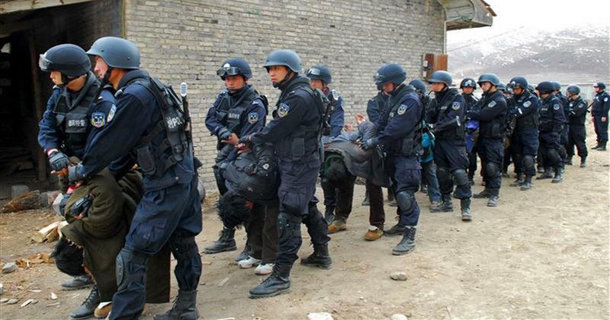
Crackdown in Ngaba Tibet Autonomous Prefecture after the wave of protests swept across Tibet in March 2008
Photo: International Campaign for Tibet
The Chinese government continues to violently suppress peaceful dissent in Tibetan areas, a new report from Human Rights Watch has testified. Since the outbreak of widespread unrest in 2008, detentions, prosecutions, and convictions remain commonplace, many now taking place in rural areas which, for the last three decades, have hardly been targeted.
This could be explained by the intense scrutiny under which city dwellers live. Cities and town are under constant surveillance, dissuading people from protesting for fear of repercussions. “The authorities are treating all Tibetans as potential dissidents and are trying to extend surveillance to the entire Tibetan community,” said Sophie Richardson, China director.
Policies to prevent dissent began to be implemented at a local level in 2012 and thousands of Chinese officials were posted to villages across Tibet as part of a ‘stability maintenance’ programme. In targeted communities, many social, cultural, and environmental activities previously considered harmless have since become the focal point of state attention and punishment.
Most detainees, from teenagers to those in their 70’s, have simply been exercising their rights to expression and assembly without advocating separatism. Others have criticised decisions by local officials in their villages, opposed mining development, advocated for greater language rights, or merely expressed sympathy for self-immolators. Dozens of demonstrations have ended with security forces opening fire on protesters. There are no reports of violence the other way around.
People with influence are more likely to be sent to trial and many of those imprisoned and prosecuted have been local community leaders, environmental activists, and villagers involved in social and cultural activities.
Human Rights Watch identified seven protests, five of them with over a hundred participants, in which villagers were demanding the release of a detained community leader. The detention of local leaders and their communities’ subsequent retaliation is a phenomenon as yet unheard of and undocumented.
“Tibetan areas are the forefront of the Chinese government’s country-wide crackdown on peaceful dissent,” Richardson stated, but “if the goal of the ‘stability maintenance’ campaign was to wipe out dissent among Tibetans, it has failed to do so. The basis of real stability is for China’s government to respect rights, understand and respond to local grievances, and roll back abuses by security forces across the plateau.”




 Print
Print Email
Email